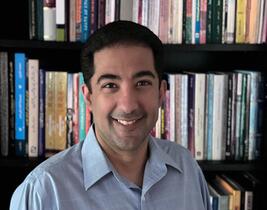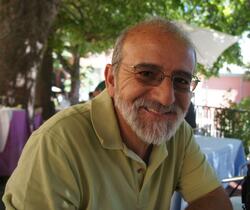Fellows 2024-2025
 Elliot K. Canfield-Dafilou studies relationships between architectural acoustics and listeners, musicians, and composers. His work is multidisciplinary and frequently combines scientific and creative endeavors. He was a researcher in the Institut Jean le Rond d’Alembert at Sorbonne Université studying the aural heritage of Notre-Dame de Paris. Elliot earned his Ph.D. from the Center for Computer Research in Music and Acoustics at Stanford University with a dissertation on Performing, Recording, and Producing Immersive Music. At Stanford, Elliot was part of the Icons of Sound project simulating Byzantine chant in the acoustics of Turkey’s Hagia Sophia. At the ISM, he will continue the exploration of how the acoustics of sacred spaces affect music and auditory perception. You can learn more about Elliot’s work at http://www.kermit.audio (link is external).
Elliot K. Canfield-Dafilou studies relationships between architectural acoustics and listeners, musicians, and composers. His work is multidisciplinary and frequently combines scientific and creative endeavors. He was a researcher in the Institut Jean le Rond d’Alembert at Sorbonne Université studying the aural heritage of Notre-Dame de Paris. Elliot earned his Ph.D. from the Center for Computer Research in Music and Acoustics at Stanford University with a dissertation on Performing, Recording, and Producing Immersive Music. At Stanford, Elliot was part of the Icons of Sound project simulating Byzantine chant in the acoustics of Turkey’s Hagia Sophia. At the ISM, he will continue the exploration of how the acoustics of sacred spaces affect music and auditory perception. You can learn more about Elliot’s work at http://www.kermit.audio (link is external).
 Hicham Chami earned his Ph.D. in Ethnomusicology from Columbia University, specializing in the indigenous musical traditions of the Jebala region in Northwest Morocco. His dissertation explored the cultural and historical impacts of colonialism and neo-colonialism on Jebli music, examining factors of cultural hegemony and marginalization within broader Moroccan musical and societal contexts. His scholarship provides a valuable framework to investigate the relationship between music and spirituality, particularly through the continued use of indigenous music in sacred contexts, which highlights the intricate interplay between these spheres. As an ISM fellow, his research includes two compelling case studies that reveal the coexistence of sacred and profane elements in Jebli music, offering insights into modalities of ecstasy and enlightenment: the Moulay Abdesslam mūssem at Jbǝl l-ʿlām and the Ḥarrāqī Tariqa in Tetuán.
Hicham Chami earned his Ph.D. in Ethnomusicology from Columbia University, specializing in the indigenous musical traditions of the Jebala region in Northwest Morocco. His dissertation explored the cultural and historical impacts of colonialism and neo-colonialism on Jebli music, examining factors of cultural hegemony and marginalization within broader Moroccan musical and societal contexts. His scholarship provides a valuable framework to investigate the relationship between music and spirituality, particularly through the continued use of indigenous music in sacred contexts, which highlights the intricate interplay between these spheres. As an ISM fellow, his research includes two compelling case studies that reveal the coexistence of sacred and profane elements in Jebli music, offering insights into modalities of ecstasy and enlightenment: the Moulay Abdesslam mūssem at Jbǝl l-ʿlām and the Ḥarrāqī Tariqa in Tetuán.
Chami’s latest scholarly contributions comprise an article in Turath—The Algerian Journal of Cultural Anthropology, a chapter in Dialogic Configurations in Post-Colonial Morocco—Rhetorical Conjectures in Arts, Culture and Politics, and various entries in the SAGE International Encyclopedia of Music and Culture. His reviews of Arab and Maghrebi scholarly literature have appeared in The World of Music, Journal of American Folklore, and Journal of Folklore Research. Chami is a frequent presenter at conferences of the Society for Ethnomusicology, Middle East Studies Association, and the International Council for Traditional Music.
 Clayton Goodgame is an anthropologist of religion, political economy, the environment, and the Middle East. His first project is a historical ethnography of the Eastern Orthodox Patriarchate of Jerusalem, an ancient church and major landowner in Palestine/Israel composed of a Palestinian laity but controlled by a Greek monastic hierarchy. The project is culminating in a book manuscript, “The Orthodox Line”, which examines the church’s religious and political dynamics in relation to land. It advances a view of the church as a sacred lineage in which both property rights and divine presence are inherited by one generation of Christians and passed on to the next.
Clayton Goodgame is an anthropologist of religion, political economy, the environment, and the Middle East. His first project is a historical ethnography of the Eastern Orthodox Patriarchate of Jerusalem, an ancient church and major landowner in Palestine/Israel composed of a Palestinian laity but controlled by a Greek monastic hierarchy. The project is culminating in a book manuscript, “The Orthodox Line”, which examines the church’s religious and political dynamics in relation to land. It advances a view of the church as a sacred lineage in which both property rights and divine presence are inherited by one generation of Christians and passed on to the next.
At Yale, Clayton is developing a new project in the borderlands of Lebanon, Palestine/Israel, and Syria. This project examines the relationship that Druze, Muslim, and Christian communities maintain with the mountain landscapes in which they have lived for centuries. It contrasts these relationships with the biblical frame of “the holy land”, seeking to clear the ground for new ways of understanding the sacred landscapes of the Eastern Mediterranean and their social, political, and economic dimensions. Clayton received a PhD in anthropology from the London School of Economics and has held fellowships at the LSE and Princeton University.

 Lav Kanoi is interested in the social-environmental dimensions of cities and urban development. His doctoral dissertation research at the combined Department of Anthropology and School of the Environment PhD program at Yale University centered on changing waterscapes in India’s National Capital Region of Delhi, where, like many other large human settlements, the city struggles to manage water equitably and sustainably in the face of increasing water crises and climate insecurity. As a Postdoctoral Associate and Lecturer in the Religion, Ecology, and Expressive Culture Initiative at the ISM, Kanoi will continue working on contemporary urban waterscapes, while developing his research on sacred water in the modern city with attention to classical Indian and European texts. Kanoi’s research has appeared in various notable journals and in book collections such as Environmental Research: Infrastructure and Sustainability and The SAGE Handbook of the Social Sciences among others. Kanoi is also a literary translator working between classical and contemporary Indian and European languages. He has previously published book translations of Kakuzo Okakura’s The Book of Tea from English to Hindi, Sukumar Ray’s Pagla Dashu stories from Bengali to Hindi, and the First Book of Virgil’s Aeneid from Latin to English.
Lav Kanoi is interested in the social-environmental dimensions of cities and urban development. His doctoral dissertation research at the combined Department of Anthropology and School of the Environment PhD program at Yale University centered on changing waterscapes in India’s National Capital Region of Delhi, where, like many other large human settlements, the city struggles to manage water equitably and sustainably in the face of increasing water crises and climate insecurity. As a Postdoctoral Associate and Lecturer in the Religion, Ecology, and Expressive Culture Initiative at the ISM, Kanoi will continue working on contemporary urban waterscapes, while developing his research on sacred water in the modern city with attention to classical Indian and European texts. Kanoi’s research has appeared in various notable journals and in book collections such as Environmental Research: Infrastructure and Sustainability and The SAGE Handbook of the Social Sciences among others. Kanoi is also a literary translator working between classical and contemporary Indian and European languages. He has previously published book translations of Kakuzo Okakura’s The Book of Tea from English to Hindi, Sukumar Ray’s Pagla Dashu stories from Bengali to Hindi, and the First Book of Virgil’s Aeneid from Latin to English.
 Harini Kumar (PhD University of Chicago) is an anthropologist of religion and was recently a postdoctoral scholar at Princeton University. Her research focuses on Islam and Muslim societies in contemporary South India, with further regional interests in Southeast Asia and the Americas. Her scholarship lies at the intersection of lived religion, kinship, gender, ethics, material culture, and migration. At Yale ISM, she will complete her first book manuscript, Formations of Tamil Islam: Belonging, Place, and Historical Consciousness in South India, which is an ethnography of Muslim religiosity and lived experience in Tamil-speaking South India. It argues against the totalizing logics of Hindu nationalism to focus instead on alternative modes of constructing self and community that do not reduce Muslim lived experience to just a minoritized identity. Kumar’s research has been supported by the Wenner-Gren Foundation, the American Institute of Indian Studies, and by several programs at the University of Chicago and Princeton University. She has also been involved in several collaborations. She was the co-curator of the two-year Power, Inequality, Dissent (link is external) project at Princeton University, and a co-PI in a multi-year, global research project titled Logistics in the Making of Mobile Worlds (link is external) funded by the Neubauer Collegium for Culture and Society.
Harini Kumar (PhD University of Chicago) is an anthropologist of religion and was recently a postdoctoral scholar at Princeton University. Her research focuses on Islam and Muslim societies in contemporary South India, with further regional interests in Southeast Asia and the Americas. Her scholarship lies at the intersection of lived religion, kinship, gender, ethics, material culture, and migration. At Yale ISM, she will complete her first book manuscript, Formations of Tamil Islam: Belonging, Place, and Historical Consciousness in South India, which is an ethnography of Muslim religiosity and lived experience in Tamil-speaking South India. It argues against the totalizing logics of Hindu nationalism to focus instead on alternative modes of constructing self and community that do not reduce Muslim lived experience to just a minoritized identity. Kumar’s research has been supported by the Wenner-Gren Foundation, the American Institute of Indian Studies, and by several programs at the University of Chicago and Princeton University. She has also been involved in several collaborations. She was the co-curator of the two-year Power, Inequality, Dissent (link is external) project at Princeton University, and a co-PI in a multi-year, global research project titled Logistics in the Making of Mobile Worlds (link is external) funded by the Neubauer Collegium for Culture and Society.
 Tyler Sampson holds a Ph.D in liturgical studies from The Catholic University of America. He was most recently a lecturer at CUA and a senior lecturer and affiliate professor at Virginia Theological Seminary. His research focuses on the history and theology of Christian liturgy in the first millennium, particularly the developments and adaptations of the liturgy of the city of Rome. While at the ISM, he will expand on his dissertation research with a project entitled, “Ordo et Ratio: Ordering, Explaining, and Celebrating Liturgy in the Early Medieval West.” With this project he aims to deepen our understanding of this critical period of liturgical history by placing manuscripts of liturgical handbooks at the center. These understudied books, with instructions, commentaries, and other texts, were central to enacting the liturgical reform of the Carolingians and reveal the creativity and diversity of its implementation.
Tyler Sampson holds a Ph.D in liturgical studies from The Catholic University of America. He was most recently a lecturer at CUA and a senior lecturer and affiliate professor at Virginia Theological Seminary. His research focuses on the history and theology of Christian liturgy in the first millennium, particularly the developments and adaptations of the liturgy of the city of Rome. While at the ISM, he will expand on his dissertation research with a project entitled, “Ordo et Ratio: Ordering, Explaining, and Celebrating Liturgy in the Early Medieval West.” With this project he aims to deepen our understanding of this critical period of liturgical history by placing manuscripts of liturgical handbooks at the center. These understudied books, with instructions, commentaries, and other texts, were central to enacting the liturgical reform of the Carolingians and reveal the creativity and diversity of its implementation.
 Edwin Seroussi (Ph.D in Music, UCLA, 1988) is the Emanuel Alexandre Professor Emeritus of Musicology and former Director of the Jewish Music Research Centre at Hebrew University of Jerusalem and Visiting Scholar at Dartmouth College. He comes to Yale after holding a Fellowship at the Herbert D. Katz Center for Advanced Judaic Studies at the University of Pennsylvania (2023/4). His research focuses on musical cultures of the Mediterranean and the Middle East, interactions between Jewish and Islamic cultures, Jewish liturgical music, Judeo-Spanish song and popular music in Israel. Within these subjects he explores process of hybridization, diaspora, nationalism, and transnationalism. His last book, Sonic Ruins of Modernity: Judeo-Spanish Folksongs Today (Routledge, 2023), stresses the agency of strategically-located individuals and their social networks, the role of recording technologies, and processes of reception and consumption in the shaping of contemporary popular music marketed as “folk.” At the ISM he will be working on a monograph on Sephardic religious music that summarizes his continuing engagement with this subject.
Edwin Seroussi (Ph.D in Music, UCLA, 1988) is the Emanuel Alexandre Professor Emeritus of Musicology and former Director of the Jewish Music Research Centre at Hebrew University of Jerusalem and Visiting Scholar at Dartmouth College. He comes to Yale after holding a Fellowship at the Herbert D. Katz Center for Advanced Judaic Studies at the University of Pennsylvania (2023/4). His research focuses on musical cultures of the Mediterranean and the Middle East, interactions between Jewish and Islamic cultures, Jewish liturgical music, Judeo-Spanish song and popular music in Israel. Within these subjects he explores process of hybridization, diaspora, nationalism, and transnationalism. His last book, Sonic Ruins of Modernity: Judeo-Spanish Folksongs Today (Routledge, 2023), stresses the agency of strategically-located individuals and their social networks, the role of recording technologies, and processes of reception and consumption in the shaping of contemporary popular music marketed as “folk.” At the ISM he will be working on a monograph on Sephardic religious music that summarizes his continuing engagement with this subject.
 Alexis Wang is assistant professor of art history at Binghamton University. She earned a Ph.D. from Columbia University, specializing in the visual and material cultures of medieval Europe and the Mediterranean. Her current research focuses on issues of materiality, cross-cultural exchange, and the intersections of art, science, and devotion in the medieval world. During her fellowship year, she will continue work on her book project, The Embedded Object: Intermedial Surfaces in Medieval Mural Decoration, which is the first comprehensive study of the practice of embedding devotional objects, such as relics and painted panels, into monumental mural images in medieval Italian churches. Eliding the traditional divisions of icon and narrative, portable and monumental, and Byzantine and Western, embedding was a widespread yet little studied practice from the eleventh to fourteenth centuries, found even in some of the most well-known monuments of Italian medieval art. Examining the real and legendary origins of embedded objects, this project contends that the setting of relics and painted panels into murals invites a broader rethinking of artistic production in the medieval Mediterranean, one that considers how a transcultural and transmedial awareness impacted the status of an image. Wang’s research has been supported by numerous grants and fellowships, including the Metropolitan Museum of Art, the Samuel H. Kress Foundation, the Gladys Krieble Delmas Foundation, and the Rome Prize at the American Academy in Rome.
Alexis Wang is assistant professor of art history at Binghamton University. She earned a Ph.D. from Columbia University, specializing in the visual and material cultures of medieval Europe and the Mediterranean. Her current research focuses on issues of materiality, cross-cultural exchange, and the intersections of art, science, and devotion in the medieval world. During her fellowship year, she will continue work on her book project, The Embedded Object: Intermedial Surfaces in Medieval Mural Decoration, which is the first comprehensive study of the practice of embedding devotional objects, such as relics and painted panels, into monumental mural images in medieval Italian churches. Eliding the traditional divisions of icon and narrative, portable and monumental, and Byzantine and Western, embedding was a widespread yet little studied practice from the eleventh to fourteenth centuries, found even in some of the most well-known monuments of Italian medieval art. Examining the real and legendary origins of embedded objects, this project contends that the setting of relics and painted panels into murals invites a broader rethinking of artistic production in the medieval Mediterranean, one that considers how a transcultural and transmedial awareness impacted the status of an image. Wang’s research has been supported by numerous grants and fellowships, including the Metropolitan Museum of Art, the Samuel H. Kress Foundation, the Gladys Krieble Delmas Foundation, and the Rome Prize at the American Academy in Rome.
